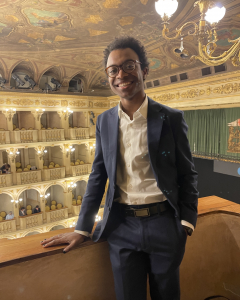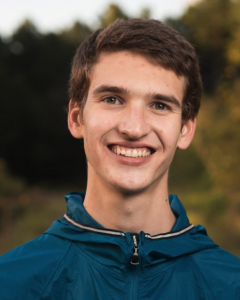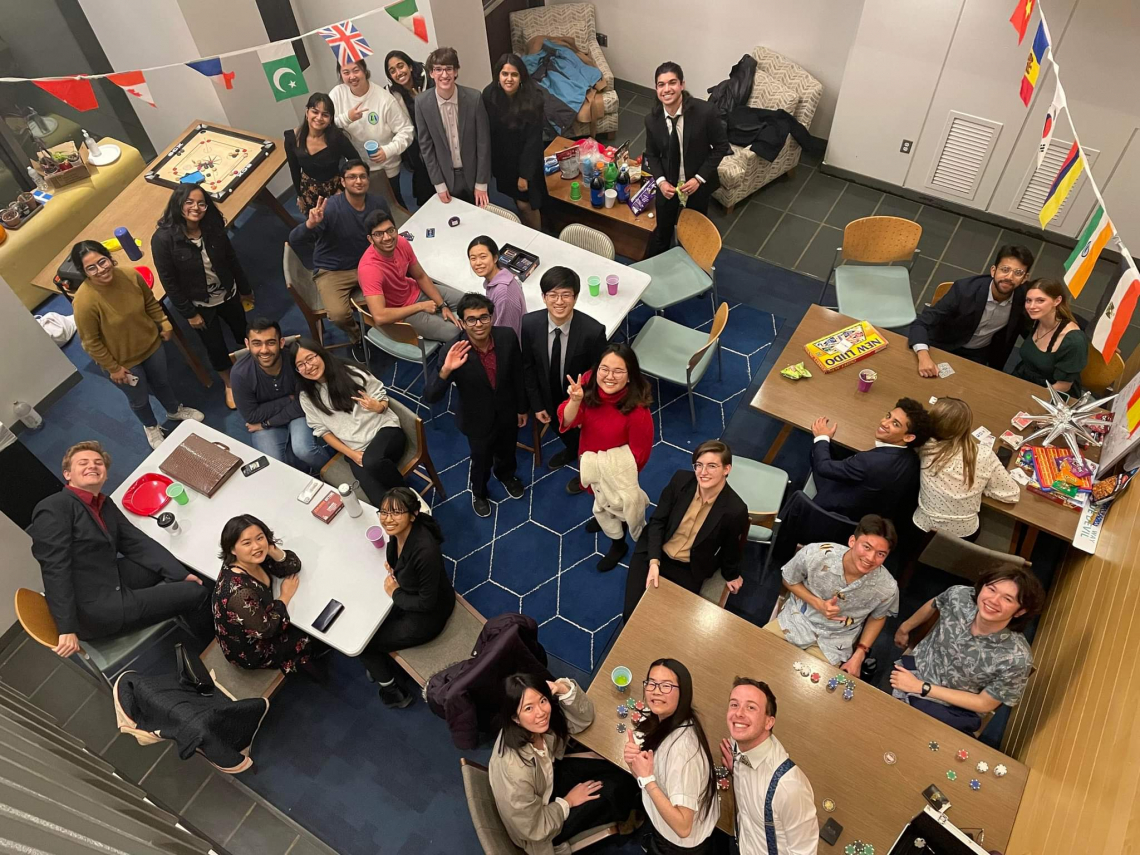Speaking from Experience
A foreign language requirement has long been part of the undergraduate experience at Duke, and the Trinity College of Arts & Sciences is home to seven departments that provide students with a wealth of options.
But in this age of technology, where translation software is at everyone’s fingertips, many wonder what students gain from language courses that they can’t get from an app on their smartphones.
“Language is pervasive, and we all communicate in one form or another,” explains Professor Luciana Fellin, faculty in the Department of Romance Studies and chair of the Trinity Language Council. “I truly believe that everybody has an innate ability to learn a second language, and with so many offerings, Duke not only expands our students’ abilities to learn but also opens their windows to different worlds.”
Thanks to Duke’s interdisciplinary nature, she says, language classes go beyond teaching vocabulary, grammar and phonemes. They also embed students in communities that build personal connections and deeper cultural understandings — and language is the tool used to get there.
“Students realize they’re living and operating in a world much bigger than the Duke campus,” Fellin shares, “and language study becomes more of an opportunity and less of a requirement.”
And what sets Duke’s language classes apart from other pedagogy?
“Without question, experiential learning,” she says.
Study away
Experiential learning takes many forms at Duke and can be as diverse as the languages taught in the classrooms — and as far afield.
Beginning with his first Italian classes at Duke, Daniel Sutton’s professor had one goal for her students: effective communication. It was less about perfect command of the language, the recent graduate explains, and more about getting to a point where a student could speak to a native Italian in a way that would get a response that was also in Italian.
“Even if we made some mistakes or our pronunciation wasn’t perfect, we would still be able to communicate successfully because we spoke in a way that was understood,” Sutton explains.
He credits the rigor in his Italian classes with preparing him for a successful study abroad experience in Bologna, Italy.
“Because of the language skills and experiential classroom learning Duke provided, I had the ability to understand the culture, and function in the country,” Sutton explains.
These forays also provided Sutton, who majored in Italian and Linguistics and minored in Gender, Sexuality & Feminist Studies, the space to zoom in on specifics within the Italian language. He began to question how gender is represented in language, an area of inquiry that fueled his thesis project, “Language and the Gendered Self: Unraveling the Framework of Gender in the Italian Language,” which examined some of the proposals from Italian speakers, including the use of the schwa (/ə/) as a gender-neutral word ending.
“Nothing is binary, and language isn’t fixed,” he says. “Educators have the responsibility to teach language as it’s used and to facilitate a diffusion of thought that expounds upon an array of backgrounds and identities.”
Sutton will soon return to Bologna as a Fulbright Scholar in the Master’s of Italian Studies, European Literary Cultures and Linguistics program. After, he plans to return to the United States to pursue a Ph.D. in linguistics with a continued focus on language and gender.
“I didn’t know until I came to Duke how important language study is,” he admits. “It’s a form of communication that builds an important foundation to everything.”
Experiences in situ
Back on campus, language faculty continue to introduce real-world contexts into the classroom, bringing grammar to life through hands-on learning that challenges students to experience and question the world outside the classroom. That means creating cultural connections, increasing self-awareness and building a sense of community.
“We want our students to truly be global citizens,” Fellin explains, “and we work toward this by using language in real-life situations and engaging in activities that help them to remember the grammar and vocabulary while opening their worlds to other cultures and histories.”
“This intentionality begins for students starting at the 101 and 102 introductory courses and continues throughout their upper levels.”
So, what can experiential language study at Duke look like?
Students enrolled in elementary and intermediate Hindi learn the vocabulary, grammar, culture and history of India through hands-on cooking modules, and Hebrew students can attend Café Ivrit, a weekly Hebrew conversation meet-up that provides a welcoming space for students to practice their language skills through conversation.
Students in the Arabic program can work on vocabulary while they learn the ancient art of calligraphy, and students can practice yoga — and their Italian — in the course Yoga in Italiano.
Fellin sees language learning classrooms at Duke as places where students engage in intellectual humility, nourish epistemic curiosity and learn to be at ease outside their comfort zones.
“While undergraduates come to the language learning experience from different backgrounds, everyone starts at the same level,” she explains.
“They learn to let go of their status and to be open to learning other viewpoints, and these experiences become much more than just memorizing the vocabulary and grammar of a language.”
The fortuitous ties that bind
Eileen Chengyin Chow has noticed something interesting during her 13 years teaching in the Department of Asian and Middle Eastern Studies: students keep forming meaningful — and often long-lasting — friendships in language classes, even if they are simply fulfilling a requirement.
Chow finds that students who are not language-focused can have an initial resistance to language learning early in a semester. But as classroom discussions and hands-on exercises increase personal interactions among classmates, those walls are a little less solid.
Preston Bowman agrees.
The 2023 graduate forged many friendships in his language courses as classroom discussions turned from conjugating verbs to conversations exploring cultures.
“The great thing about my language classes was that I had fellow students sharing their perspectives and histories,” he says, “and I found it easy to ask classmates to grab a meal after class or to exchange contact information.”
“When students share the same experiences that they’re having when learning something new, that is very fertile ground for lasting friendships.”
A Neuroscience major with minors in both Chinese and Linguistics, Bowman always found language study important because of its fundamental humanity. But without the addition of the cultural backdrop, he says, “it all feels a little monochrome, transactional and disconnected.”
Living with language
Luckily, Duke has many ways to ensure culture and community are highlighted.
“These amazing communities have been built up around the common ground students share as they study a language and culture,” Chow explains, “and these bonds continue to exist outside the classroom from weekly dinner groups to student language clubs to LangDorm.”
LangDorm is a Living Learning Community that is home to 50 juniors and seniors who share a love of language and culture.
“It’s a new connective tissue that cuts community borders differently on campus, not in ways normally expected like society-based modes,” explains Chow, who serves as an advisor along with Fellin.
“Living with people outside of your culture is important and can be life changing,” Chow says. “It’s a place to focus on shared experiences.”
Because of the bonds he built in language courses and strengthened through shared meals, Bowman decided to live in LangDorm for both his junior and senior years.
“From the very first information meeting, I could tell that the community was very supportive,” he says. “Having a unified interest in learning about language and culture led to the discussions I craved when I came to Duke, and living in LangDorm satisfied my craving.”
Language learning took up a lot of Bowman’s undergraduate time. But what he gained was more than worth it.
“I would have had a lot more time each day, that’s for sure,” he says, “but I wouldn’t be so fascinated by society or culture at large — and the way I see the world would probably be quite different.










